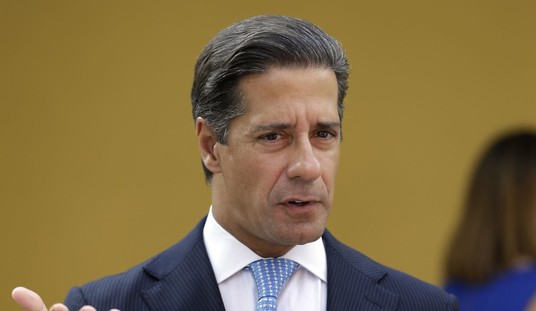Is this despite the Democrats’ push to impeach Donald Trump — or because of it? Voter enthusiasm has already begun to spike upward for the 2020 election, Gallup’s latest survey reports, but in an unusual way. Nearly two-thirds of Democrats report being more excited about the next election, which is normal for the opposition party.
Being edged out by their competitors? Not as normal:
Currently, about two in three Republicans (66%) and Democrats (65%) report being more excited about voting than they were in previous elections. This differs from the typical pattern Gallup has seen over the years, whereby those who identify with the political party of the incumbent president have been less enthusiastic about voting than members of the opposing party. This is true whether that president is running for election or leaving office.
As Democratic President Bill Clinton was preparing to leave office, Republicans and Republican-leaning independents were more likely than Democrats and Democratic-leaning independents to express greater fervor for voting — by 12 percentage points in both polls Gallup took leading up to the 2000 election.
This partisan gap was present throughout 2008 when Republican President George W. Bush’s term was ending: Democrats were more likely to report an increase in their enthusiasm for voting than Republicans in all nine polls Gallup conducted that year.
And during both elections when Democratic President Barack Obama was in office, Democrats expressed less enthusiasm for voting than Republicans. This was true during Obama’s reelection campaign in 2012 as well as in the election to replace him in 2016 — though the partisan gap narrowed just before Election Day 2016.
Before we get to the caveats, here’s a look at the historical chart covering the last eighteen years:
Note that this isn’t entirely predictive, even if one ignores the fact that presidents are elected in 50 state contests rather than one national election. Democrats did all right in 2012’s presidential election despite being lightly motivated, although that may have had more to do with Barack Obama’s incredible campaign organization than anything else. Democrats were a lot more enthusiastic in 2010 than in 2012, but suffered a national and state-level disaster in that midterm election. It appears that there is no data in this series between now and the 2016 election too, so that straight line is a charting artifact rather than a trend.
That actually is a shame, because some intermediate data would answer the question I asked in the beginning: is this despite impeachment or because of it? Given the turnout and the results of the midterms, the late-2018 datapoint would likely have shown a low point for the GOP and a peak for Democrats, but there’s no way to extrapolate this data to be sure of that.
What we do know from Gallup’s data is that his more enthusiastic of an electorate six-plus months out from an election that they’ve measured. It barely edges 2008’s February reading of 62%, which was taken in the middle of a primary season where both parties were looking at open nominations. It’s nearly 20 points higher than its most recent parallel of November 2011 (43%), a year out from an incumbent’s re-election bid.
So what’s different this time around? This time, the incumbent president’s voters are fired up. Perhaps we can’t prove that’s because of the impeachment fight, but it certainly appears to be strongly correlated to it. And that’s very very bad news for House Democrats, who won their majority a year ago when the normal cycle of midterm malaise struck the GOP.
And what’s more, it’s starting to sink into the electorate’s consciousness. Today’s Politico/Morning Consult survey shows that 56% of voters now expect to see Donald Trump win the next election:
With less than a year to go before the 2020 election, a majority of registered voters say they think it’s at least somewhat likely that President Donald Trump will secure a second term in the White House, a new poll has found, with more than two-fifths of voters saying the president will be top of mind when casting their vote next November.
According to a POLITICO/Morning Consult survey released on Wednesday, 56 percent of voters expect the president to be reelected next year, including 85 percent of Republicans and 51 percent of independents. By comparison, more than a third of Democrats (35 percent) say the same. …
More than eight in 10 voters say they are motivated to turn out and vote in 2020, with 69 percent saying they are “very motivated.” Majorities of voters across the political spectrum say they are “very motivated” to vote in the presidential election. That enthusiasm is driven by Democrats and Republicans — roughly three-quarters of voters in each party describe themselves as especially energized.
And that enthusiasm would seem to translate into voting prospects — 92 percent of respondents say they are likely to turn out and vote in the election next year, including 96 percent of Democrats and Republicans and 86 percent of independents.
The impeachment of 1998 backfired on Republicans. History might be repeating itself in 2019-20. What’s most important, by the way, is where that enthusiasm is rising among Republicans — and it’s in those swing states where this backfire might reach its zenith. This is precisely what I warned about in my column at The Week:
The easy response to that is to echo Trump’s self-assessment as an extraordinary politician, but the real answer may be less about Trump than it is about these voters. The 2016 election was driven by rejection of the establishment in both political parties; Clinton managed to survive a close primary, but populist voters pushed Trump to the GOP nomination. In the general election, the same voters rejected Clinton’s promise of establishment continuity for Trump’s disruption of establishment control. …
Seen in this light, House Democrats may have set themselves up for a huge backfire. Their demands for impeachment could look very much like a concerted effort by the political establishment to thwart the will of these voters.
Trump ran in 2016 as the only man strong enough to run against the establishment. By pursuing impeachment at all costs, especially with no hope at all of having a Republican Senate removing him, Democrats might inadvertently prove Trump correct — and give him an even stronger populist argument for 2020.
House Democrats might well be impeaching Trump into a second term in office.









Join the conversation as a VIP Member